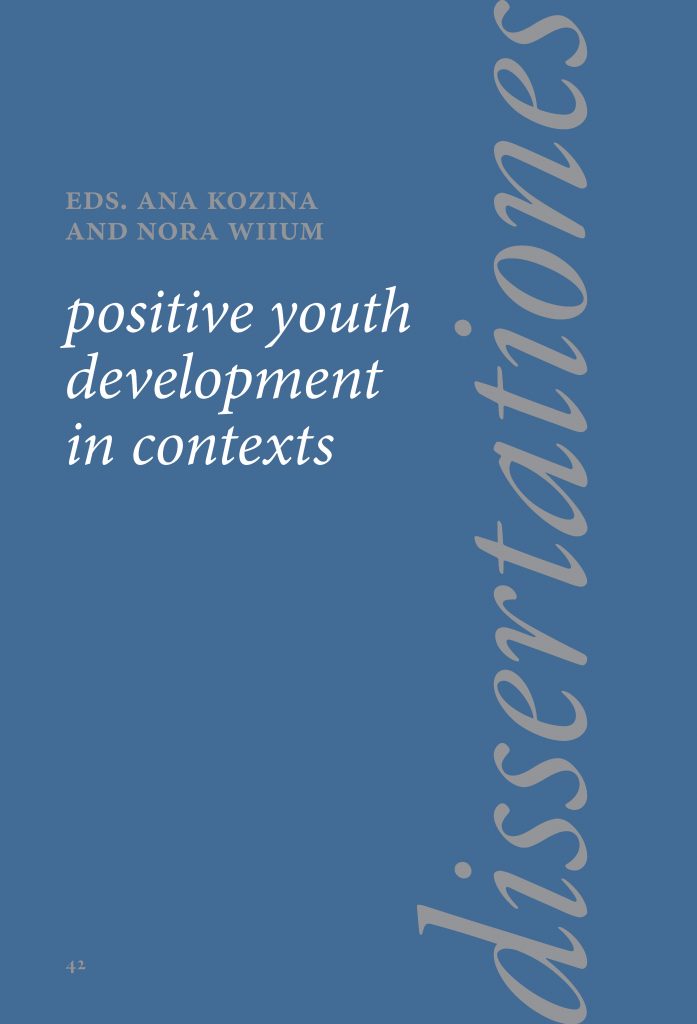
Positive Youth Development in Contexts.
Urednik(i): Ana Kozina, Nora Wiium
Vrsta gradiva: znanstvena monografija
Leto izdaje: 2021
Obseg: 266 strani
ISBN-13 (PDF): 978-961-270-341-7
ISBN-13 (HTML): 978-961-270-342-4
Način citiranja:
APA
Kozina, A., Wiium, N. (eds.) (2021). Positive Youth Development in Contexts. Ljubljana: Pedagoški inštitut.
https://www.doi.org/10.32320/978-961-270-341-7
MLA
Kozina, Ana, Wiium, Nora, eds. Positive Youth Development in Contexts. Ljubljana: Pedagoški inštitut, 2021.
<https://www.doi.org/10.32320/978-961-270-339-4>
This monograph offers a starting point for Positive Youth Development research in Slovenia with clear links to the research in international settings. An overview is also provided of the complexities of the various contexts of Europe and Slovenia able to influence positive youth development. Thus, while the research reported in the monograph focuses on the Slovenian context, it is ambitious enough to also reach beyond the country’s borders to include the international research community. In addition to novelty and innovation in a scientific context, the presented research is socially relevant, especially for its inclusion of immigrants and other young people at risk in the school and wider social contexts.
Vsebina ⎜Contents
- Ana Kozina and Nora Wiium ▪︎ Foreword: The Significance of Contexts in Positive Youth Development
- Sofia Nag Delgado, Nilei Kattarina Huang, Nora Wiium ▪︎ Positive Youth Development and Thriving in Norwegian Youth
- Fitim Uka, Arian Musliu, Tringa Mehmeti, Shkurte Bajgora, Vlera Isufi ▪︎ The effects of 5Cs and Developmental Assets on Well-being and Satisfaction with Life Among Youth in Kosovo
- Diego Gomez-Baya, Carmen Martin-Gomez, Catia Branquinho, Gina Tome, Margarida Gaspar de Matos ▪︎ Developmental Assets and Healthy Lifestyles among Spanish Youth
- Tina Pivec ▪︎ Measuring Positive Youth Development in Slovenia with a Focus on Gender and School-Level Differences
- Katja Košir ▪︎ Preventing bullying: Peer culture as the crucial developmental context in adolescence
- Polona Gradišek ▪︎ Character strengths of first-year student teachers and the 5 Cs of the Positive Youth Development framework: A mixed-methods study
- Ana Mlekuž ▪︎ Components of positive youth development among native students and students with an immigrant background in the Slovenian educational environment
- Ana Lampret ▪︎ Contact-based interventions to reduce ethnic prejudice against migrants and ethnic minorities in the school context: A systematic literature review
- Janja Žmavc ▪︎ Mobilising the potential held by one’s entire linguistic repertoire for positive youth development
- Laura Ferrer-Wreder and Sabina Kapetanovic ▪︎ Commentary: Exploring the Positive Potentials of Diverse European Youth: What Makes Individual and Contextual Thriving Possible?
- Urška Štremfel ▪︎ Commentary: Positive Youth Development: Implications of Research for European Policy and Practice
Prenosov: 89
 PEDAGOŠKI INŠTITUT
PEDAGOŠKI INŠTITUT